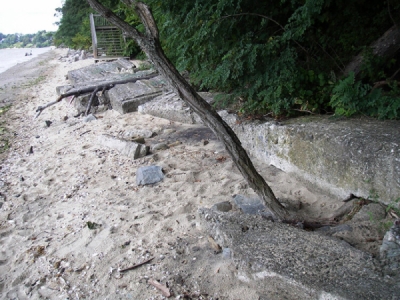
Posted on April 11, 2020
By ecoRI News staff
The Rhode Island Coastal Resources Management Council (CRMC) has awarded funding for seven habitat restoration projects in the 17th year of its Rhode Island Coastal and Estuarine Habitat Restoration Trust Fund.
CRMC approved the funding at a meeting last month. A number of the projects have a resiliency focus this year, including a shoreline restoration project, salt marsh and dune restoration projects, a shoreline adaptation project, and a riverine edge restoration. Two other projects involve fish passage or riverine habitat improvements.
As with the previous years, in its request for proposals CRMC put special emphasis on projects that would enhance the resiliency of Rhode Island’s coastal habitats to climate change and sea-level rise.
Here are the projects that are being funded this year by CRMC’s restoration fund:
The Bristol County Water Authority and its partners received $75,000 for the second phase of a project to remove the upper Kickemuit River dam in Warren. Design, engineering, and permitting of the project has taken place and received funds from the fund last year.
This round of funding will allow the partners to conduct a sediment assessment, study of the bottom of the river, well testing, and additional engineering and permitting. Removal of the dam will restore 16 acres of anadromous fish habitat and freshwater wetlands.
In 2007, the Rhode Island Department of Environmental Management’s Division of Fish and Wildlife and its partners built a fish ladder at the lower Kickemuit River dam, but the river herring population hasn’t recovered since that time partly because of check valves on the flow outlets of the upper dam. The dam’s removal will be the first step in abandoning this vulnerable drinking water supply and will enhance river connectivity, improve fish passage into the upper river, increase freshwater wetland habitat, and reduce infrastructure flooding.
The Nature Conservancy in Rhode Island received $66,000 for improving fish passage at the Belville Fish Ladder in North Kingstown. Project partners aim to improve upstream and downstream passage for the diadromous fish runs in the Annaquatucket River watershed by installing a set of rock weirs downstream of the existing entrance channel to provide proper depth between the stream channel and the ladder.
The project also aims to increase the size of the anadromous fish population and eventual supply of forage species to recreational and commercial fish in the watershed, lower Narragansett Bay, and Rhode Island Sound. The partners received funding in 2019 from the fund to conduct similar improvements to the Hamilton Fish Ladder, also on this waterway.
The Nature Conservancy and its partners, including CRMC, received $40,000 to reduce coastal erosion using nature-based infrastructure at Rose Larisa Memorial Park in East Providence. The public park is bordered by a steep bluff and is subject to high-energy tidal and wave action, causing bluff erosion which threatens nearby residential properties and the park itself.
Plans include the restoration of a 100-foot stretch of eroding bluff, and to test the effectiveness of using nature-based solutions, including salt marsh creation at the base of the bluff and building an intertidal rock sill to try to trap sand.
The town of Barrington and partners, including CRMC, received $27,450 for a Walker Farm salt marsh migration and buffer restoration and resilience project. The project will restore about a third of an acre of shoreline habitat, along with 300 feet of shoreline bordering Hundred Acre Cove. This project is part of a larger effort, which includes restoring an additional two-thirds of an acre of salt marsh and coastal buffer habitat.
The Nature Conservancy received $6,000 for a Goosewing Beach salt marsh restoration project in Little Compton. The project will address the phragmites problem in 16 acres extending over 4,000 feet of shoreline at Quicksand Pond.
The Norman Bird Sanctuary received $4,900 for dune habitat restoration at Third Beach in Middletown. The area suffers from significant erosion impacts, particularly as a result of human foot traffic from beachgoers cutting through the dunes, as well as from sea-level rise and storm surge. Project partners plan to plant native vegetation to restore the eroded areas, create natural barriers to discourage future foot traffic, and to restore native ecosystems, species, and biodiversity. Coordinated volunteer planting efforts are expected to start this month.
In addition to these fully funded projects, CRMC also approved partial funding ($5,650) for coastal upland edge restoration in the Blackstone Park Conservation District in Providence. The Blackstone Parks Conservancy and its partners plan to restore an eroded trail in the park and adjacent forest by stabilizing the trail, adding plants, and protecting sensitive trail entrance points with fencing and signage.
Money for the fund’s habitat restoration projects comes from the state’s Oil Spill Prevention Administration and Response Act, established by the Legislature following the 1996 North Cape oil spill.
To date, the fund has awarded $3.6 million for 136 projects, which have leveraged more than $28 million in matching funds. In its 17 years, the fund has helped to restore some 300 acres of coastal and estuarine habitat.
Source: ecori.org





